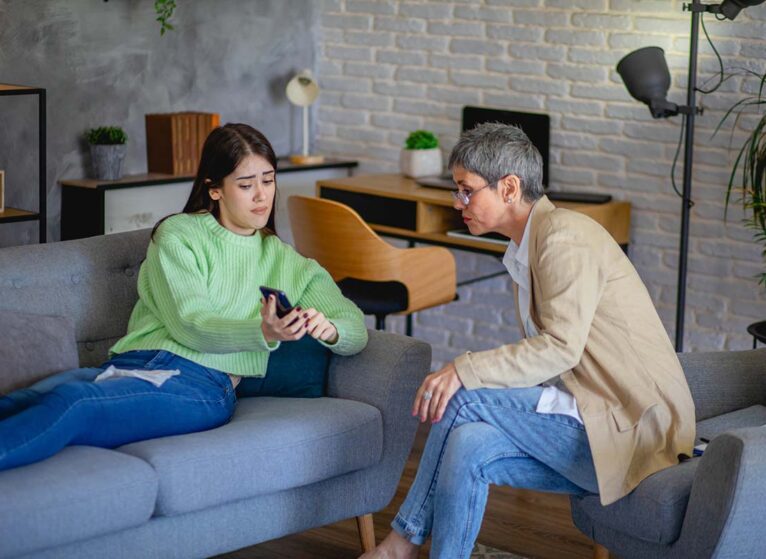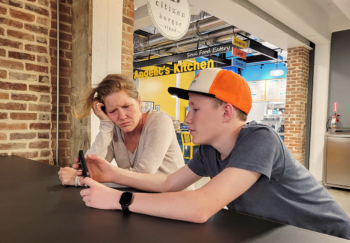Teenagers get all sorts of information from social media. Some good, some not so good.
And just like adults, a lot of the information (and misinformation) they’re seeing is about health. As more people share their personal stories of neurodivergence, mental health, migraines, nutritional deficiencies, diet sensitivities, and other medical conditions, these conversations are moving into the open. And the flood of this content is leading teens to a central question: Do I also have this condition?
This has led to a wave of kids seeking a formal diagnosis for conditions they've already begun to identify with, often based on vague symptoms with a wide array of possible causes. For parents, it can leave them unsure of what to do next.
Any time your child shares a concern about their health, it's important to take it seriously. Even if it's on trend and doesn't seem consistent with what you've seen from them.
UVA Health Children’s clinical psychologists Emily T. O'Gorman, PhD, and Evan J. Anderson, PhD, share their advice for navigating healthcare information on social media.
Is there value in social media for mental health?
O’Gorman: I do like seeing mental health being talked about more. There's some destigmatization on social media that is probably ultimately good. If these are things that we're able to talk about, then people are going to get the help that they might need.
Do the benefits outweigh the risks? I don't know. The risk of social media can be so much broader than just self-diagnosis. There are a lot of legitimate risks and concerns there.
There's also a little bit of a danger in labels and over-attaching to them and letting that become you as a person. But there's still some benefit to being able to accept all the parts of yourself.
What or whom can you trust on social media?
O’Gorman: It’s hard because you usually don’t see people’s credentials on TikTok. Look at all social media with a healthy dose of skepticism. Encourage that skepticism in your teen.
I encourage people to use reputable sources for mental health information. This includes:
- Medical journals
- ADDitutde, a website about ADHD
- American Psychological Association
- Healthy Children, the American Academy of Pediatrics parenting site
A Trusted Source: Your Pediatrician
Your pediatrician can help with accurate medical information, testing, referrals, and everything you need to move health concerns offline.
How much medical misinformation is out there?
Anderson: Trauma information is, by far, the greatest offender of misinformation on social media. That’s followed quickly by autism spectrum disorder and ADHD. We have data that shows a third of the information on mental health conditions is not scientifically sound.
There's a saying in the autism community that when you know one person with autism, you know one person with autism. When people talk about their experience with autism in more generalized global terms on social media, that can easily implant misinformation.
Why are kids more likely to fall for misinformation about mental health?
Anderson: It's about novelty-seeking. When you have increased engagement with social media or video games, kids’ ability to pay attention to “boring content” is lowered. They seek simplified, short-form information. That becomes their primary source of information. They don't really have the tools to do a long form of research because they don't have the attention span for it. That information isn't novel and simple enough.
What kinds of harm can come from misinformation about mental health?
Anderson: Misinformation tends to get more engagement. From a social media business model, that's precisely what you're after. And so, social media companies have no motivation to filter out misinformation.
A third of people change the management of their diagnosis based on information they've heard online. That's not a small number. Only 50% of those people check with their providers first. And that's just the people that we know.
What is the good side of social media when it comes to mental health?
O’Gorman: Don't use social media for the answers. Use it for questions. Allow it to highlight blind spots and things that you haven't thought of before. Use it to gather information that you can do more reading on. And never change your behavior based on something on TikTok without checking it out with a healthcare provider first.
How can parents help their teenagers navigate mental health misinformation on social media?
Anderson: Social media should be a collaborative effort between the child and their caregivers. Middle school kids need supervision so you can have discussions, and so they aren’t exposed to too many fringe ideas.
As teenagers get older, they need more independence because ultimately, they're going to be on their own with social media.
The number one predictor of adoption of this kind of misinformation is multiple exposures to it. If a kid is going down a rabbit hole, they're going to adopt a piece of misinformation as true because they've seen it often. That’s why you really should be checking in on social media and telling them you’re going to check in.


